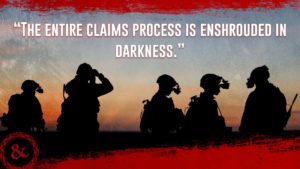Military medical malpractice cases demand a thorough examination of complex medical procedures, adherence to standards of care, and the implications of military protocols. One key element that can significantly influence the outcome of these cases is the role of expert witnesses. In this comprehensive guide, we’ll delve into the crucial role that expert witnesses play in military medical malpractice claims and how their testimony can be instrumental in building a strong and compelling case.
Defining the Role of Expert Witnesses:
In legal proceedings, an expert witness is an individual with specialized knowledge, skills, education, or experience in a particular field relevant to the case. In military medical malpractice claims, expert witnesses are often medical professionals who can provide their expertise to help the court understand the standard of care, the specifics of the alleged malpractice, and the resulting damages.
Establishing the Standard of Care:
One primary function of expert witnesses in military medical malpractice cases is to establish the standard of care. They help the court understand what a competent and reasonably skilled healthcare provider would have done under similar circumstances. This standard serves as a benchmark against which the actions of the military healthcare provider are evaluated.
Analyzing Negligence and Causation:
Expert witnesses play a crucial role in determining whether negligence occurred and if it directly caused harm to the service member. They evaluate the facts of the case, including medical records, procedures performed, and the patient’s outcome, to provide an expert opinion on whether the healthcare provider deviated from the standard of care and if that deviation directly led to the alleged harm.
Navigating Military Protocols and Regulations:
Military medical facilities operate within a unique framework of protocols and regulations. Expert witnesses with experience in military healthcare can help interpret and explain these regulations to the court. This is particularly important in cases where adherence to military protocols is a central element of the defense or prosecution’s argument.
Providing Insight into Specialized Medical Procedures:
Military medical malpractice cases often involve specialized procedures and treatments. Expert witnesses bring a depth of knowledge and experience in these areas, offering insights into the intricacies of military medicine. Their testimony can help the court understand the nuances of complex medical procedures and the challenges faced by military healthcare providers.
Presenting Complicated Medical Evidence in Lay Terms:
One of the critical roles of expert witnesses is to present complex medical evidence in a way that is accessible to the judge and jury. They act as educators, breaking down technical jargon and providing clear explanations that allow the court to make informed decisions based on the evidence presented.
Strengthening the Plaintiff’s or Defense’s Case:
Depending on the side they represent, expert witnesses contribute to either the plaintiff’s or defense’s case. Their testimony can bolster the credibility of the arguments presented, providing a persuasive narrative that supports the legal claims being made.
Testifying in Depositions and Court Proceedings:
Expert witnesses may be called upon to testify in depositions or court proceedings. Their testimony is subject to cross-examination, where opposing counsel may challenge their opinions and qualifications. A well-prepared and credible expert witness can withstand scrutiny, strengthening the case they are supporting.
Determining Damages and Long-Term Impacts:
In cases where damages are claimed, expert witnesses can assess the extent of the harm suffered by the service member. They can provide insights into the long-term physical, emotional, and financial impacts of the alleged medical malpractice, aiding the court in determining appropriate compensation.
Adhering to Legal and Ethical Standards:
Expert witnesses must adhere to legal and ethical standards when providing their testimony. Their credibility hinges on their ability to remain impartial, objective, and transparent about their methods and conclusions. Attorneys often carefully select expert witnesses who have a reputation for professionalism and integrity.
Conclusion:
The role of expert witnesses in military medical malpractice claims is pivotal in establishing the facts, interpreting medical evidence, and presenting a compelling case to the court. Their specialized knowledge contributes significantly to the legal process, helping judges and juries understand the complexities of military healthcare and make informed decisions. For service members seeking justice, having qualified and credible expert witnesses can be instrumental in pursuing a successful outcome in their medical malpractice claims.
If you or a loved one has been a victim of military medical malpractice, contact us for a confidential consultation. Our legal team is committed to leveraging the expertise of qualified expert witnesses to build a robust case and pursue justice on your behalf. Don’t navigate these complexities alone – let us guide you through the legal process and seek the accountability and compensation you deserve.

 Call Now- Open 24/7
Call Now- Open 24/7





